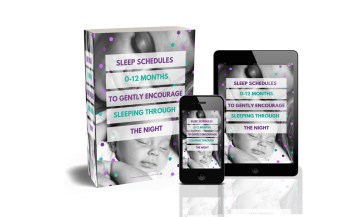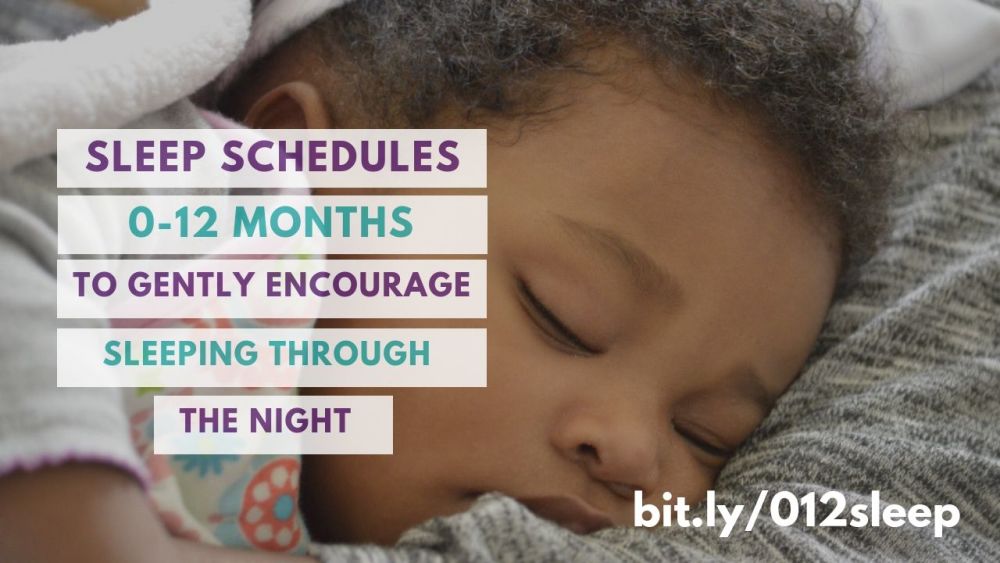The 4 Month Sleep Regression Doesn't Exist!
Posted on
 There's no such thing as the 4 month regression
There's no such thing as the 4 month regression
You may have heard of sleep regressions before, a sleep regression is a developmental progression that has an impact on way a baby or toddler in some way. It could be that your baby used to sleep through the night and now wakes up again to feed, or your baby waking more frequently overnight than before. They typically occur around the ages of 4 months, 9 months, 12 months, 18 months and around every 6 months or so in the toddler years. However the '4 month regression' that happens first cannot really be described as a regression but rather a permanent change in how your baby sleeps.
Happening anytime between 2 - 6 months of age this regression marks the maturation of your baby’s sleep cycles to more adult like sleep cycles.
So what happens?
Before the ‘regression’ when your baby first fell asleep, they fell into REM sleep , (R.E.M. means rapid eye movement and this is the state of sleep when we often dream.) Then your babys sleep transitions into NREM sleep (known as Non REM stage 3/4 sleep) and cycles between the two sleep stages throughout their sleep.
When your baby's sleep cycle matures to that of a more adult like sleep cycle. Instead of falling asleep and entering into REM sleep first, your baby now drifts into a light sleep known as NREM sleep 1 / 2 then into deep sleep stage NREM sleep 3 / 4 then into REM sleep last . This way of sleeping is a more adult like sleep cycle, but unfortunately although sleep cycles are now more adult like…. This change does not lengthen the sleep cycles significantly ( sorry ).
This change in the way your baby’s sleep cycles through varying depths can feel very different to your baby & many babies can struggle with the transition between sleep stages. Often waking and needing help to get back to sleep overnight and sometimes at nap times too. Hence the ‘regression’ or disruption to sleep. So you now might notice that the things that used to calm and help your baby settle before aren't working quite so well as or if your baby used to settle to sleep quite easily on their own before now struggle and seem to need more cuddles and input from your to get themselves sleeping. This is all very normal.
How to survive this change in sleep for your baby
Not every baby experiences a disruption in sleep, however these changes to your baby's sleep cycles are unavoidable, there are some things you can do to minimise sleep disruption if your baby finds adjusting to these changes challenging.
Avoid Overtiredness.
Overtiredness tends to make sleep worse causing frequent night waking and early morning waking too (read more about overtiredness and its impact here), structure your babies daytime naps to avoid overtiredness but don’t let your baby nap too much that they are undertired at bedtime and aren’t ready to sleep. Get help with structuring naps and total nap times here
More patience may be needed.
Your little one may struggle to transition between sleep cycles and wake up more often needing help to get back to sleep. Nap times and overnight sleep may become more challenging as your baby wakes more often and may need your help to get back to sleep where they perhaps didn't need help before. Many mums worry about creating ‘bad’ habits by doing this but IMHO if your baby was previously sleeping well and settling without help before, helping them quickly get back to sleep in the short term preserves sleep rather than making it worse. Leaving your baby to cry to sleep instead of supporting them can potentially harm the connection/attachment between you as these changes to sleep can feel different and what worked to get them sleeping before ( leaving them to settle on their own because they could) may not work now due to these changes but it's all temporary, I find responding quickly to them to calm them and soothe them back to sleep is best. Your baby may also become more cranky, more clingy and may cry much more often during the day as well as at night. You might notice that your babyneed more of your attention than before and many mums can be left feeling drained or touched out. If you can allow your partner and other family members to support you or , Avoid overtiredness as much as possible by structuring naps, but also keep your routines in place. Stick to your daily routines as much as possible. the timings of your routines should always be flexible but try to keep the flow of your babies day constant. Keep doing your bedtime routine ( roughly at the same time, in the same order( bath, massage pjs, feed cuddle then into cot or the order your normally do yours) as well as your pre nap ritual and your daily routines etc. This is a time of rapid development for your baby which can seem very unsettling not only will there be changes t the way they sleep but also their knowledge and undertsanding of the world around them is developing too, their body is growing and they are gaining more and more control over their bodies and movement. Sticking to your daily routines provides a familiar anchor to a day that has had many variables and changes to their development. The 4th and 5th month of a babies life involves rapid development and that can be a unsettling for your baby, keeping familiar routines in place is one of the things that can help your baby feel more secure in a period of lots of change. The book and app The Wonder Weeks is a brilliant resource for explaining how your babys brain and intellect and their growiing knowledge of the environment aorund them can impact on behaviour attachment and temperament. It describes these developmental progressions as leaps and can explain what the world looks like for a baby at that developmental stage.
get back to sleep. Nap times and overnight sleep may become more challenging as your baby wakes more often and may need your help to get back to sleep where they perhaps didn't need help before. Many mums worry about creating ‘bad’ habits by doing this but IMHO if your baby was previously sleeping well and settling without help before, helping them quickly get back to sleep in the short term preserves sleep rather than making it worse. Leaving your baby to cry to sleep instead of supporting them can potentially harm the connection/attachment between you as these changes to sleep can feel different and what worked to get them sleeping before ( leaving them to settle on their own because they could) may not work now due to these changes but it's all temporary, I find responding quickly to them to calm them and soothe them back to sleep is best. Your baby may also become more cranky, more clingy and may cry much more often during the day as well as at night. You might notice that your babyneed more of your attention than before and many mums can be left feeling drained or touched out. If you can allow your partner and other family members to support you or , Avoid overtiredness as much as possible by structuring naps, but also keep your routines in place. Stick to your daily routines as much as possible. the timings of your routines should always be flexible but try to keep the flow of your babies day constant. Keep doing your bedtime routine ( roughly at the same time, in the same order( bath, massage pjs, feed cuddle then into cot or the order your normally do yours) as well as your pre nap ritual and your daily routines etc. This is a time of rapid development for your baby which can seem very unsettling not only will there be changes t the way they sleep but also their knowledge and undertsanding of the world around them is developing too, their body is growing and they are gaining more and more control over their bodies and movement. Sticking to your daily routines provides a familiar anchor to a day that has had many variables and changes to their development. The 4th and 5th month of a babies life involves rapid development and that can be a unsettling for your baby, keeping familiar routines in place is one of the things that can help your baby feel more secure in a period of lots of change. The book and app The Wonder Weeks is a brilliant resource for explaining how your babys brain and intellect and their growiing knowledge of the environment aorund them can impact on behaviour attachment and temperament. It describes these developmental progressions as leaps and can explain what the world looks like for a baby at that developmental stage.
Overnight hunger may increase
During periods of rapid brain growth and development your little one may become hungrier even overnight. They may wake up and seem hungry where before they’d perhaps not woken for feeds in a while. This rapid growth requires more energy and glucose basically making baby hungrier. Many mums worry that giving a bottle or feeding again overnight is encouraging bad habits, but i disagree. Hungry babies may find it difficult to settle to sleep ( i know i can’t sleep if i’m hungry) so i often advise mums who worry about night feeding again to work from a " don’t offer, don’t refuse” stand point.
If you can settle baby back to sleep without a feed then great, go with it. But if it's obvious that your baby is hungry and won’t settle then refusing a feed is unfair. It’s better to feed, calm and settle them back to sleep.
If you are in the midst of dealing with the 4 month sleep regression right now, i have something that can help you understand whats going on with your baby and show you how to help them get past it and back to sleeping again. Click here for more info
Have you got YOUR copy of my e-book yet?
I have 3 ebooks I created for you whether you have a newborn, a 6-12month baby or a toddler, they all have their sleep challenges so i created these for your quick reference, when you need some quick tips for sleep. They can be downloaded to your smartphone, tablet or kindle app or read online.
'Newborn Sleep Tips For First Time Mums' click here to download it
'Sleep Schedules For 0-12 Month Olds To Gently Encourage Sleeping Through The Night' click here to download
'10 Top Tips To Get Your Toddler or Preschooler Sleeping.' click here to download
To access my FB group, the sleep schedules for 0-12 months or anything else baby sleep check out the links on my linktree here




